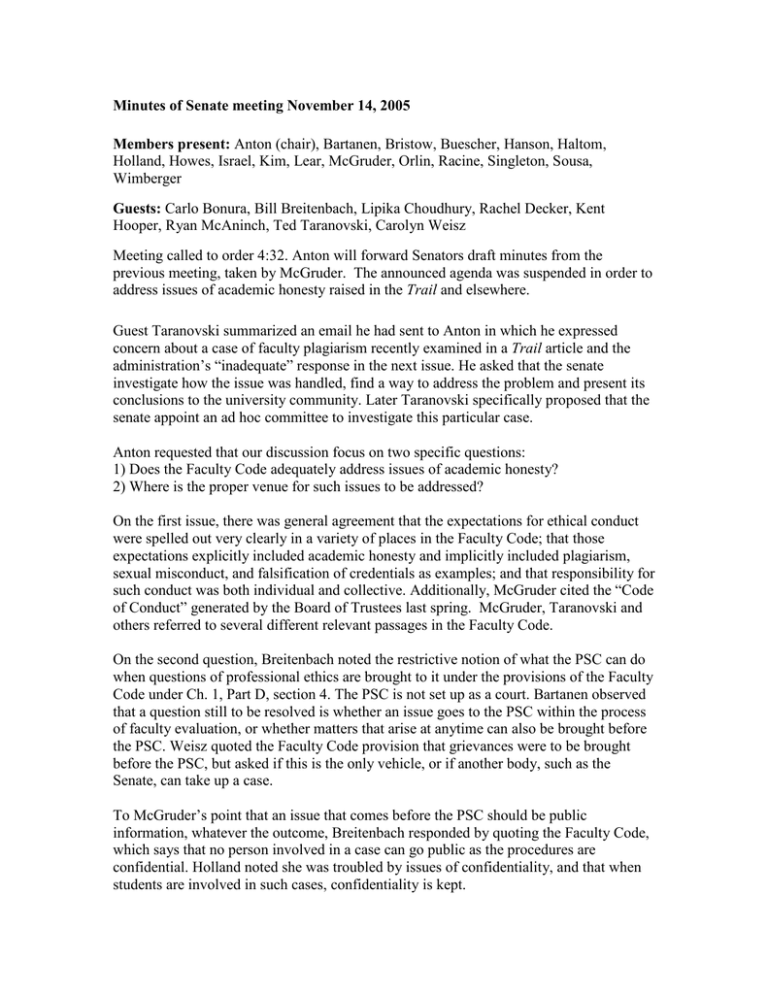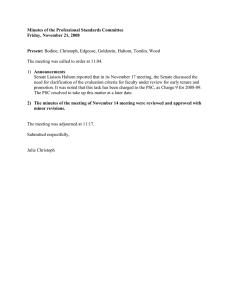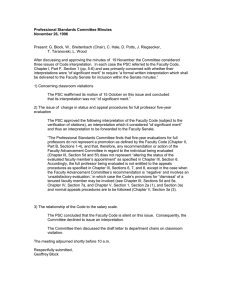
Minutes of Senate meeting November 14, 2005
Members present: Anton (chair), Bartanen, Bristow, Buescher, Hanson, Haltom,
Holland, Howes, Israel, Kim, Lear, McGruder, Orlin, Racine, Singleton, Sousa,
Wimberger
Guests: Carlo Bonura, Bill Breitenbach, Lipika Choudhury, Rachel Decker, Kent
Hooper, Ryan McAninch, Ted Taranovski, Carolyn Weisz
Meeting called to order 4:32. Anton will forward Senators draft minutes from the
previous meeting, taken by McGruder. The announced agenda was suspended in order to
address issues of academic honesty raised in the Trail and elsewhere.
Guest Taranovski summarized an email he had sent to Anton in which he expressed
concern about a case of faculty plagiarism recently examined in a Trail article and the
administration’s “inadequate” response in the next issue. He asked that the senate
investigate how the issue was handled, find a way to address the problem and present its
conclusions to the university community. Later Taranovski specifically proposed that the
senate appoint an ad hoc committee to investigate this particular case.
Anton requested that our discussion focus on two specific questions:
1) Does the Faculty Code adequately address issues of academic honesty?
2) Where is the proper venue for such issues to be addressed?
On the first issue, there was general agreement that the expectations for ethical conduct
were spelled out very clearly in a variety of places in the Faculty Code; that those
expectations explicitly included academic honesty and implicitly included plagiarism,
sexual misconduct, and falsification of credentials as examples; and that responsibility for
such conduct was both individual and collective. Additionally, McGruder cited the “Code
of Conduct” generated by the Board of Trustees last spring. McGruder, Taranovski and
others referred to several different relevant passages in the Faculty Code.
On the second question, Breitenbach noted the restrictive notion of what the PSC can do
when questions of professional ethics are brought to it under the provisions of the Faculty
Code under Ch. 1, Part D, section 4. The PSC is not set up as a court. Bartanen observed
that a question still to be resolved is whether an issue goes to the PSC within the process
of faculty evaluation, or whether matters that arise at anytime can also be brought before
the PSC. Weisz quoted the Faculty Code provision that grievances were to be brought
before the PSC, but asked if this is the only vehicle, or if another body, such as the
Senate, can take up a case.
To McGruder’s point that an issue that comes before the PSC should be public
information, whatever the outcome, Breitenbach responded by quoting the Faculty Code,
which says that no person involved in a case can go public as the procedures are
confidential. Holland noted she was troubled by issues of confidentiality, and that when
students are involved in such cases, confidentiality is kept.
Buescher asked whether it is possible to file a grievance in response to a grievance
decision, as distinguished from an appeal by one of the parties to a grievance. Haltom
noted that at this time, just as the FAC can’t be grieved, neither can the PSC. An
individual involved in a grievance might be able to appeal to the President, to whom the
PSC sends its report, but no non-party has the right to any appeal according to the Faculty
Code.
Sousa questioned whether the policing of the academic integrity of the faculty should rely
on one person’s grieving another, rather than being an issue for the faculty as a whole.
Weisz clarified a question from Bristow, explaining that the university administration can
also file a complaint to the PSC. Bartanen answered another question from Bristow by
noting that complaints of sexual harassment go to specific university officers charged
with that issue.
Taranovski noted that Chapter 5 of the Faculty Code provides for a pro-active guardian
role by the university administration. Weisz added that the consequence for a grievance is
ultimately decided by the president. While others noted that procedures for dismissal are
often tied to the evaluation process, following a specific timed cycle, Bartanen cited the
Faculty Code’s provision for the Dean to bring charges of dismissal which, if contested,
go to the PSC at any time.
McGruder argued that a series of cases raises questions about the Faculty Code; while a
system is in place for when issues come up, procedures may be insufficient or unclear,
and may lead to issues being swept under the rug. McGruder opined that it isn’t enough
to say the Faculty Code is adequate.
Haltom opined that it is easier to move forward prospectively than to go back
retrospectively, but that the senate might come up with a proposal for revisions to
procedures outlined in the Faculty Code that could be sent back to the PSC for feedback.
He added that the FAC is not qualified to address many such issues, since it doesn’t
gather evidence, can’t investigate, and is ultimately designed to receive information and
deal with it. In contrast to the PSC, which is better set up to deal with such issues, the
FAC can’t demand specific documents from evaluees accused.
Decker noted that the Faculty Code is clear on ethics, but not clear on how to deal with
cases of plagiarism. She offered the example of MIT, which recently had to create
procedures to deal with faculty plagiarism and thus our need to develop specific
mechanisms to respond to academic honesty issues.
McGruder insisted that plagiarism cases are relatively easy to prove compared to cases of
sexual misconduct or other issues.
Buescher warned that the senate cannot work retroactively and that it would be a slippery
slope if the senate were to begin fielding grievances. Bartanen also cautioned against
going down a road where personnel policies become part of the public record. Problems
dealt with by administrators must uphold confidentiality and can’t be made public to the
community or media.
Taranovski suggested that confidentiality can be observed at various levels; the university
publishes accounts of incidents of sexual harassment without mentioning names. In the
case alluded to in the Trail there is no evidence that anything has been done by the
university. Bartanen insisted that in her response to the Trail, she explained that
provisions of the Faculty Code had been followed, and that should be accepted as
evidence.
Wimberger reiterated that the Faculty Code addresses the issues of academic honesty but
may not be adequate. The way to determine what is wrong with the Faculty Code is to
find out what worked and what didn’t work. Later he added that we can’t work
proactively without knowing and learning from what happened in the past.
Israel acknowledged that issues of confidentiality had to be balanced with the desire of
people to know what happened and what university policies are, and hoped for some
compromise between both needs. He recounted that many students have been guessing
and coming up with a variety of names of possible professors, talking to their parents and
saying they would not take classes from these professors. Choudhury later noted that
Trail reporters had been careful to not mention names in their article, but repeated that
students were wondering who they were alluding to and felt it was a serious issue.
Orlin opined that there are degrees of plagiarism, and that not all cases of student
plagiarism lead to expulsion, which is why procedures are important.
Holland acknowledged that Trail writers had handled issues of confidentiality well, and
expected that the rumors going around will eventually die down.
McGruder insisted that there are various kinds of confidentiality. Alcohol abuse is not the
same as academic honesty, in which professors play a key role. In the case alluded to in
the Trail there are questions about how procedures were followed, and these were
legitimate issues that should be taken up.
Weisz pointed out that plagiarism can be murky, and once they are on the public record,
they touch on other issues; it isn’t simply comparing two documents as McGruder had
suggested. But following the process doesn’t mean that justice is done, nor will all these
issues necessarily be resolved by changing the process.
McGruder proposed that the senate ask the PSC for a report informing the Senate on
actions taken during 2003-2004.
Sousa agreed with a point made by Israel, that student and faculty plagiarism were very
different. He also noted that the PSC is a committee of the Senate, yet often we can’t
know what it does due to issues of confidentiality. He admitted that Wimberger “may
have his finger on something” in that prospective action requires a retrospective look.
Sousa noted that in his brief time on the Senate he had noted a pattern of “agency loss”
between the Senate and PSC. Haltom relished the idea of “agency loss” appearing in the
minutes, a term and sentiment duly noted here by a scribe that doesn’t fully understand
either.
Several senators endorsed the idea that a subcommittee of the Senate reflect on general
procedures, not on specific cases. A motion was proposed by McGruder, modified by
discussion, and passed by the senate as follows:
The Faculty Senate will create an ad hoc committee to consult with members of the PSC
of the past 3 years to recap the procedures followed in all grievances since academic year
2003-2004.
Anton announced that the original agenda for today’s meeting would now be postponed
until the next (Nov. 28) meeting. Meeting adjourned at 6:15.
Respectfully submitted,
John Lear



